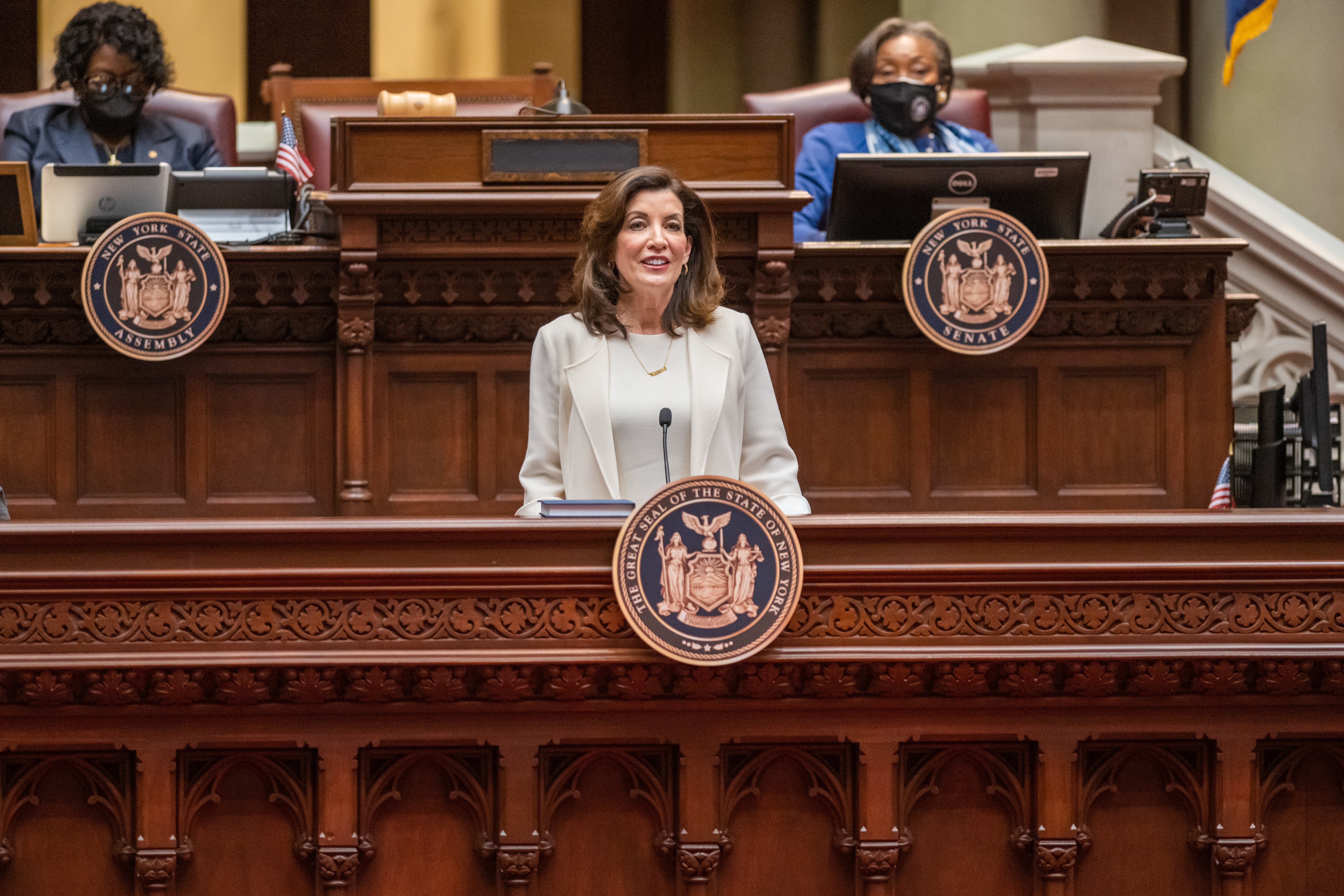Dozens of new charter schools could open in New York City under a proposal unveiled Wednesday by Gov. Kathy Hochul, a move that would allow new city charters to be issued for the first time since 2019.
The governor’s plan, which was tucked into her executive budget, would effectively abolish the local cap on charter schools in New York City, allowing charter operators to vie for about 85 charters that haven’t been used in other parts of the state.
In addition, the proposal calls for reissuing charters that were granted to schools that later closed or had their charters revoked, unlocking about 21 new so-called “zombie” charter schools statewide, according to the governor’s office. New York City operators would also be eligible to vie for those charters.
The statewide cap of 460 charter schools would not be raised.
The fate of the governor’s proposal is far from certain and will be subject to negotiations as part of the budget process, which is expected to wrap up by April 1. Unlike in 2015, the last time state officials increased the city charter cap, the legislature is squarely controlled by Democrats, many of whom are opposed to the sector’s growth. About 275 charter schools, which are privately managed yet publicly funded, currently operate in New York City.
It’s also unclear how much political capital Hochul, a Democrat, is willing to spend on a potentially bruising fight to lift the charter cap in New York City — a policy idea she was reluctant to embrace until the final days of her campaign. The governor did not highlight the proposal during a speech unveiling the executive budget.
Hochul received campaign contributions from major pro-charter groups but received even more from educator unions, which have been fiercely opposed to growing the number of charter schools, which are typically not unionized.
“Governor Hochul believes every student deserves a quality education, and we are proposing to give New York families more options and opportunities to succeed,” a spokesperson for Hochul wrote in a statement.
Adding new charter schools in New York City is complicated by dwindling student enrollment. The city’s traditional public schools have seen enrollment declines accelerate during the pandemic, and opening additional charter schools could lead to even more pronounced losses, threatening school budgets or even prompting school mergers or closures.
That dynamic could impact existing charter schools, too, most of which have also struggled with enrollment declines during the pandemic (although the sector has grown overall). Some of the city’s largest networks, including Success Academy and Uncommon Schools, are struggling to fill all of their seats.
Still, pro charter groups immediately praised the governor’s proposal. “A budget is a reflection of priorities — and with this budget proposal, Governor Hochul has proven that she prioritizes the voices and needs of students and families first,” James Merriman, CEO of the New York City Charter School Center, wrote in a statement. (The charter center offered slightly different tallies of the number of charters that would become available to the city. They indicated 84 charters are available outside New York City and 23 zombie charters could be reissued.)
Some legislative leaders immediately shot down the governor’s proposal. State Sen. John Liu said in a statement that allowing more charter schools to operate is a “nonstarter,” arguing there is “no justification” for risking the closure of district schools for the sake of the charter sector’s growth.
Michael Mulgrew, head of the city’s teachers union, also sharply criticized the governor’s proposal. “Public resources should go to real public schools — not to corporate charter chains that claim success by refusing to serve our most vulnerable children, that force out students who don’t fit their mold, and that refuse to permit independent audits of their spending,” he wrote in a statement.
Assembly Speaker Carl Heastie did not immediately reject the governor’s charter school proposal, though he hinted it may receive a chilly reception. “The Assembly’s focus really is about — has always been about — trying to take care of the needs of the traditional public schools,” he told reporters. “Charter schools has traditionally been a tough issue in the conference. But you know, with that being said, there are members who support charters.”
Senate Majority Leader Andrea Stewart-Cousins did not immediately respond to a request for comment.
The governor’s proposal may receive a warmer reception from Mayor Eric Adams, who is generally more supportive of charter schools than his predecessor. Adams has previously said he supports getting zombie charter schools “back on line.” (An Adams spokesperson said the mayor is reviewing the governor’s budget proposal.)
The announcement was welcome news to Arthur Samuels, who co-founded MESA Charter High School in Bushwick. MESA’s leadership won “pre-approval” in 2019 to open a second Brooklyn high school, but were unable to do so because of the charter cap. If the governor’s proposal is approved, Samuels said MESA would “seriously consider” opening a second high school.
“We still don’t have enough slots at MESA to serve the students who apply,” Samuels said. Hochul’s proposal “says to me that the governor’s priority is trying to give a similar level of choice and access to families that have historically been denied it.”
Alex Zimmerman is a reporter for Chalkbeat New York, covering NYC public schools. Contact Alex at azimmerman@chalkbeat.org.





